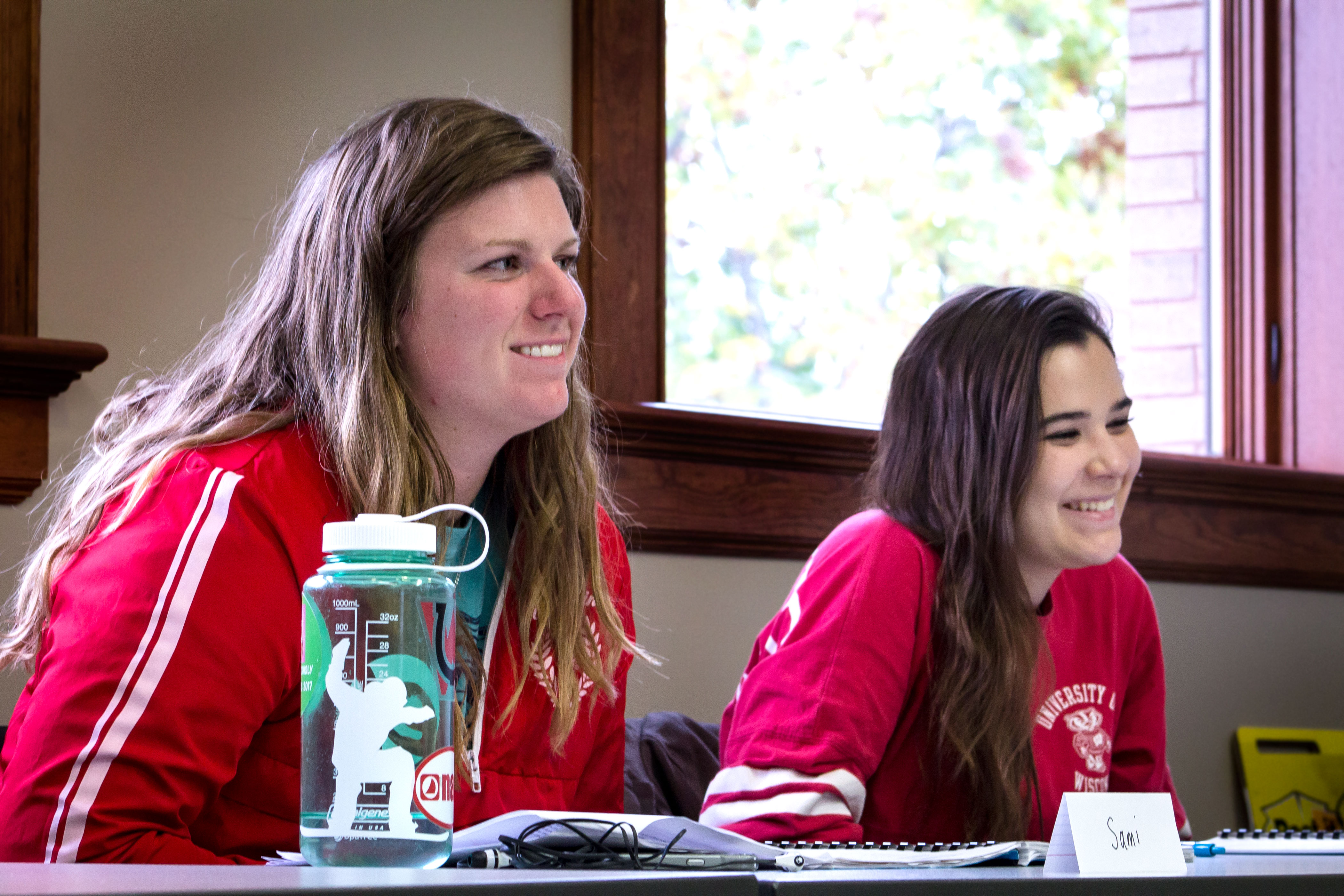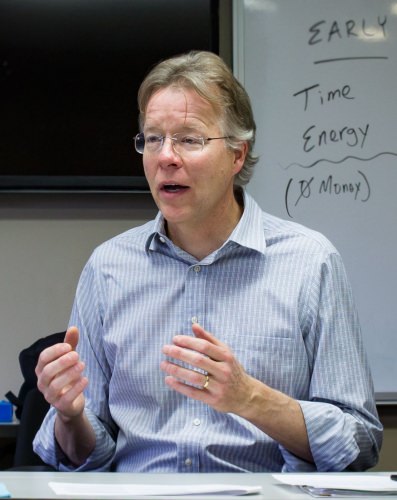Amid midterms, finals, one class is teaching students how to relax

UW senior Samantha Taylor, a personal finance major, and UW senior Cristina Callan, an economics major, listen during Rob Sepich’s class on stress management. Emily Hamer
With a midterm season that never seems to end and finals just around the corner, there’s very little time to relax, let alone simply take a breath. But one class on campus is helping students do just that.
“You can just sit back and get comfortable,” Rob Sepich, instructor of Counseling Psychology 105, tells his students. As tranquil music hums in the background, Sepich guides his students through an exercise to help them let go of their stressful thoughts.
“You can leave your eyes open or closed, whatever you’d like,” Sepich says. “And throughout the exercise … random thoughts are going to occur to you, which is really normal. So when they do, just gently notice them and really gently come back to your next breath.”

Rob Sepich, student relations manager at University Health Services, has been teaching the stress management class for the past 20 years. Emily Hamer
Counseling Psychology 105: Emphasis on Stress Reduction/Relaxation is a “highly experiential” class that aims to teach students how to manage their stress and practice mindfulness. Sepich, who is also student relations manager at University Health Services, has been teaching the course for the past 20 years.
UW fifth-year senior Noro Datiri, who is taking the class, says throughout life there is always a pressure to get involved in more things, but usually not an emphasis on caring for yourself.
“Once you got to college, people … tell you you have to do all these things and have a well-rounded resume in order to get into the business school, or in order to get a job, or like an internship,” Datiri says. “You always feel like you always have to do something. No one ever talks about just relaxing and taking time for yourself and having self-care.”
To start class, students have a discussion about their homework assignment (which is usually doing a behavioral practice from class at home). The second part is a lecture where Sepich shares research and real-life examples about the impacts of stress. Next, they talk about the readings for that week. To end, Sepich guides students through a relaxation or mindfulness technique, such as muscle relaxation, meditation or guided imagery.
In addition to the stress management class, Sepich also hosts around 75 presentations a year outside of UHS to help students with stress management, wellness, test taking and insomnia.
But Sepich says his goal isn’t to eliminate stress completely, but rather help students have control over it. Forty percent of our daily happiness is within our own control, Sepich says.
Sepich says we have 40,000-50,000 thoughts a day, and around half of them are untrue. Negative thoughts can prevent us from accomplishing things that we are fully capable of doing. For instance, if someone accepts that they’re afraid of public speaking or a procrastinator, Sepich says that person will likely be stuck repeating that behavior because they see it as a part of their character.
One of the strategies Sepich teaches students to move past these stressors is to think about the prefix “up until now.”
“It’s just an acknowledgment of hope,” Sepich says. “No matter how you describe yourself, if you inject that before your statement — like up until now I’ve been afraid of public speaking — there’s now the possibility of change.”
Sepich also teaches students “guided imagery” strategies to reframe our thoughts. If you have a big project you’re stressing out about, imagine it as a giant IMAX screen, but then picture it slowly getting smaller and smaller in front of you. If you’re overwhelmed by all you have to do, take a moment to sit silently and let your stressful thoughts flit by as if they were clouds.
To encourage self-care, Sepich also teaches students to place a high value on sleep. A good test of whether or not you’re getting good sleep is to ask yourself whether you wake up feeling rested in the morning and don’t feel like you need a nap in the afternoon. Most students fail this test, meaning they’re not getting enough sleep, Sepich says. Sleeping more, or even taking 20-minute power naps, can significantly improve a student’s well being.
Another way to modify our thinking for the better is to change the way we think about time. Sepich says our society focuses so much on time and rushing from one thing to the next that doing as much as possible in a short amount of time causes students anxiety. Sepich says it can help to “transcend our focus on time” and slow down every once and a while.
He suggests picking out certain activities during the day, such as showering, eating or walking to class, to not multitask. This lets the mind decompress.
UW senior Cristina Callan, who is taking Sepich’s mindfulness class, says it’s important to take a step back from school and stress to enjoy life.
“You gotta find that balance between spending your time on you and spending time on things that will get you … money and your success and all that,” Callan says. “Because what is all that worth if you don’t feel good? And if you don’t enjoy your life? I don’t want to live to work I want to work to live and then enjoy my life in the meantime.”
Sepich’s class will continue to be offered in future semesters. While Sepich has gotten consistent positive feedback on his course — some even saying it was their favorite class throughout all of college — Sepich says he wants to continue to improve.
“My goal is to be even better and in 2018, to not feel like I’ve peaked,” Sepich says. “To feel like I’m always learning from students, as well and from research, and using the best methods I can to help empower students to be their own best stress managers.”



